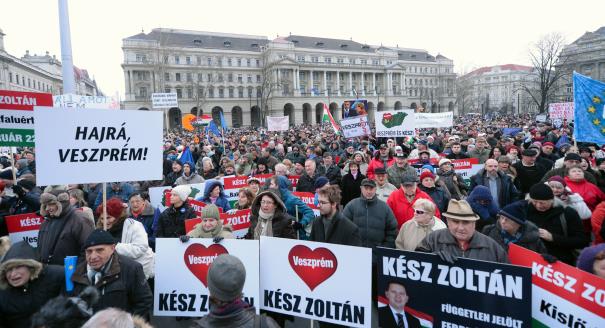When Viktor Orbán was elected prime minister of Hungary in 2010, he promised that his conservative Fidesz party would complete the transformation from a Socialist country to a modern democratic society. In Orbán’s view, the system he inherited was riddled with corruption. Remnants of the old Communist system were still intact. There was little transparency in how economic decisions were made.
But since 2010, Fidesz, which has twice won a two-thirds parliamentary majority, has not completed Hungary’s transition. If anything, the democratic gains made by the country during the 1990s are being undermined in a way that shows that the transformation of a post-Communist country is not irreversible.
The experiences of Hungary and of other Central and Eastern European countries also show that it is the citizens who can make or undo the transformation of their societies. That is regardless of which party is in power, and of whether or not a country is a member of the EU.
But Orbán’s style of governing, which his supporters deem unassailable, may yet succumb to citizens’ unwillingness to accept Fidesz’s grip on power. On February 22, an independent candidate, Zoltán Kész, won a by-election in Veszprem, southwest of Budapest. This had been a Fidesz stronghold. When, during the election campaign, the party realized it might have to work to retain the seat, it promised the voters all sorts of goodies.
“The government promised a new Olympic size swimming pool,” wrote Eva Balogh, political analyst and editor of the blog Hungarian Spectrum. “Mihály Varga, minister of economy, told the voters in a robo-call that if they don’t vote for the Fidesz candidate they will not receive any favors from Budapest. Neither the promise nor the threat worked.”
Fidesz lost the seat—and its two-thirds parliamentary majority.
In neighboring Romania, there was until recently a sense of despair, especially among young people. Campaigns by civil society movements to tackle pervasive corruption, a culture of deceit, and the cynicism of the country’s political elites had little success. Transformation in this EU member state was cosmetic.
It is citizens who make or undo the transformation of their societies.Tweet This
Until November 2014. That was when Romanian citizens young and old elected Klaus Iohannis as president. Iohannis had run on an anticorruption platform. It hit a nerve, particularly among the tens of thousands of Romanians who had left the country once the EU had allowed them to work anywhere in the bloc.
Tired of appalling governance and persistent lip service to reforms, but also exposed to functioning market economies and democracies elsewhere, citizens voted for change. Since then, with Iohannis at the helm, Romanian Prime Minister Victor Ponta has suddenly embraced reform and anticorruption measures issues that he had blithely ignored over the years. The judiciary and the courts are being overhauled. Sentences are being meted out to corrupt officials.
Alina Mungiu-Pippidi, a Romanian expert and professor of democracy studies at the Hertie School of Governance, says it is still very early days. But there is some hope that the transformation has finally begun.
What happens in Romania could affect neighboring Moldova. Although not in the EU, in June 2014 the government in Chişinau signed an Association Agreement with Brussels. That gave Moldova extensive trade and economic benefits, among other things. Above all, the accord should have given the country’s political elites the chance to strengthen Moldova’s weak democratic institutions and slowly change its political culture.
But Moldova’s leaders didn’t seize that opportunity. Former prime minister Iurie Leancă’s pro-European coalition did not grasp how the Association Agreement could help Moldova accelerate the transformation of its political and economic system. Instead, a culture of bickering, corruption, self-interest, and cynicism prevailed.
At parliamentary elections held in November 2014, pro-European parties won the narrowest of victories but then failed to form another government. On February 20, 2015, a minority government was installed. Few analysts expect any positive change.
What a gift for Russia. For more than two decades, the Kremlin has been supporting pro-Russian nationalists in the Moldovan breakaway region of Transnistria. This frozen conflict has had a debilitating effect on Moldova’s politics. But ultimately, it is the corruption and the political elites’ unwillingness to transform the country that have held Moldova back.
Corruption and the elites' unwillingness to reform have held #Moldova back.Tweet This
Civil society movements are in despair. And because the Romanian government has made it easy to issue passports to Moldovans (the majority of whom speak Romanian), many young people have left to work in EU countries.
Maybe these Moldovan citizens will emulate what Romanians did when they voted for change by electing Iohannis as president. Without citizen power, change will not happen, and transformations will not be completed. Indeed, transitions could even be reversed.



.png)






